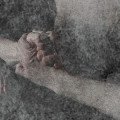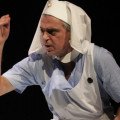Directed by Peter Stein, the play is emblematic but “unexpected”. A real Pinter’s play, cruel and ironic at the same time – A review by Maria Grazia Gregori
There is almost always a house, maybe just a room or an enclosed area, in Harold Pinter’s plays. Even though I was always convinced, he has been a great playwright, and now we can perceive more clearly why. There is always a family, a couple or a triangle, men and women coming and going. Everything that is “outside” is mysterious, essentially alien, but what takes place between those four walls is cruel, hard to endure and live. From this point of view, Homecoming (1965), directed by Peter Stein and staged at Piccolo Teatro Grassi in Milan is symbolic, but at the same time, it is an “unexpected” Pinter; Pinter more than ever, cruel and at the same time full of irony, so subtle that sometimes causes an absolutely liberating laughter.
The director, with some coquetry, argues that it is a text and a show for actors. It’s true, in fact Pinter himself was an actor, and loved actors. The interpreters of this Homecoming, starting from Paolo Graziosi, are all very good. Yet we remain of the idea, or rather the conviction, that the Stein’s shiny, tight, ironic and profound, never prevaricating direction plays a fundamental role in the success of this show, that received a lot of applause from the audience.
So here we are in a house placed in the suburbs of London, dominated by Max, a former butcher, a true father-master who rules the family without a shred of tenderness (the way Paolo Graziosi acts this petty, vulgar and violent character has to be underlined). And there’s Lenny, the eldest son, a neurotic geek with the soul of a pimp (Pinter himself played the role in the first staging of the text, here rendered with a provocative, unctuous presence by Alessandro Averone), while her younger son Joey, an aspiring boxer, fitness fanatic and body care but with sexual problem is bravely interpreted by Rosario Lisma. Sam ‘s brother, Max, a taxi driver who’s melancholy character is played by Elia Schilton with rare finesse – being able to transmit all his secret pain – is also part of this bewildering, maladjusted family.
In the scene beautifully set by Ferdinand Woegerbauer which grows upward suggesting the upper level of the house, where torn between sofas, great banging of dishes and a few furnishings yelling at you, you will engage in acts of mutual violence, while the chickens of the past come home to roost, revealing anxieties, betrayal, pain and unbearable psychological violence. Unexpectedly, arriving from Venice, comes another son, Teddy (Andrea Nicolini), a professor of philosophy in the U.S., accompanied by his wife Ruth. When the time comes to go back home to their children, surprisingly Ruth will not. To interpret her character, Stein has chosen Arianna Scommegna, who plays it with ductility. She shows us the tempering of iron of a woman who has realized the great power that she will have taking advantage of the need for sex of the men of the family, and their aim to make money from her. In Stein’s directing there is nothing abstract, there are no suspensions and even the famous Pinter “pauses” are reflected in the actions and gestures of the actors, who underline the provisional insecurity through which the author still speaks to us with all his unsettling, ironic cruelty.
Il ritorno a casa (Homecoming)
by Harold Pinter, translation by Alessandra Serra
directed by Peter Stein
scenery by Ferdinand Woegerbauer
costumes by Anna Maria Heinreich
lights by Roberto Innocenti
assistant director Carlo Bellamio
with (in order of appearance) Paolo Graziosi, Alessandro Averone, Elia Schilton, Rosario Lisma, Andrea Nicolini, Arianna Scommegna.
Seen at Piccolo Teatro Grassi in Milan. On stage until 1st December 2013.
Produced by Teatro Metastasio Stabile of Tuscany, Spoleto56 Festival dei 2 mondi


















